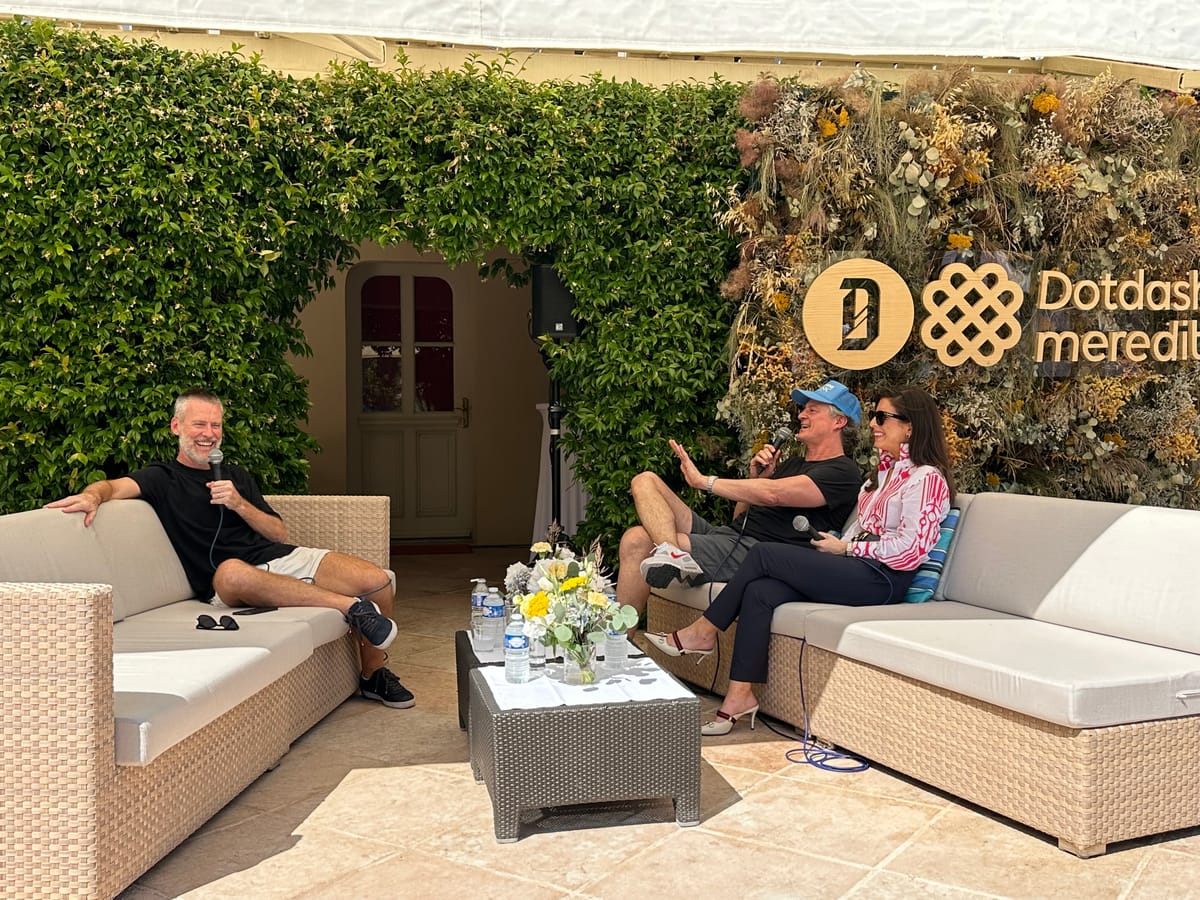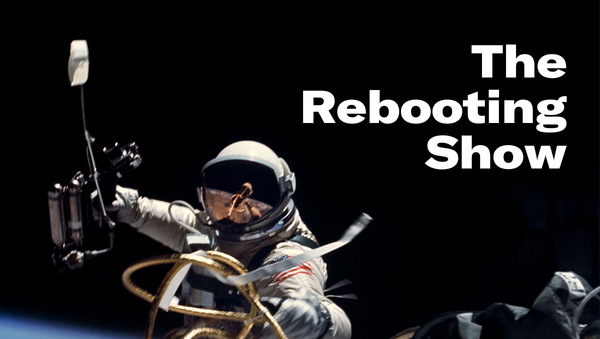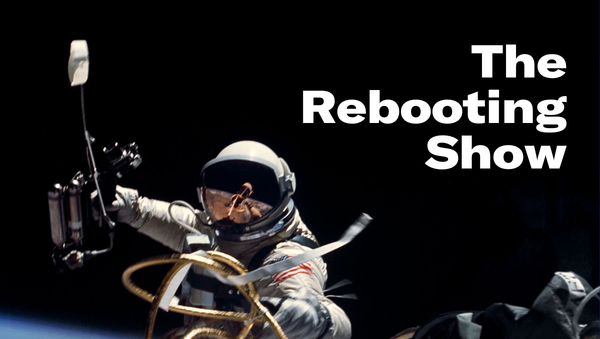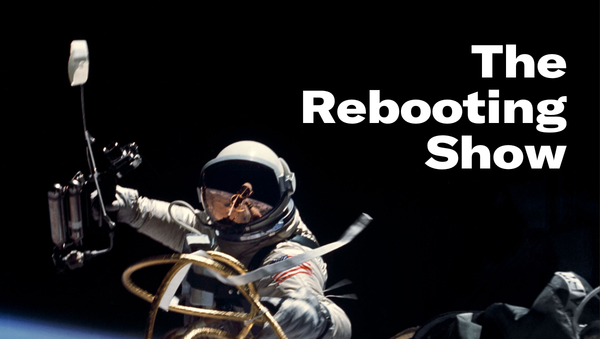AI optimism in the Riviera
How publishers can create leverage

Another Cannes Lions is in the books. Yesterday, we held a live recording of a new episode of People vs Algorithms at the Dotdash Meredith villa, with DDM CEO Neil Vogel and Axios media correspondent Sara Fischer subbing in for Troy and Alex. Neil, who I’ve done approximately 50 podcasts with over the years, is widely considered one of the most sensible of media executives. The big theme for me from this conversation and others during the week is that publishers need to find leverage to avoid being rolled by AI giants. The government is certainly not coming to the rescue.
The best case for optimism is practical: Publishers can create leverage to extract concessions. "It's not fair" won't get you very far with this crowd.
Meredith Levien, CEO of The New York Times, made the point in her podcast recording with Mixed Signals that its deal with Amazon in contrast to its litigation with Open AI makes the point that it is not averse to deals, only that it needs to both be paid and exert a degree of control over how its content is used. Meredith bristles at lumping Times journalism into the "data" bucket. "IP" is better. The Times has unique leverage most publishers do not.
Cloudlflare has emerged as something of a white knight for publishers. Cloudflare is an infrastructure chokepoint, which gives it leverage. And it has a CEO in Matthew Prince who is sounding the alarm that publishers face an existential crisis with AI that can only be met with coordinated action to block AI crawler to extract concessions. As Sara pointed out, the action has moved from mostly dubious deals for training data to far wider agreements that include current information. The past is the past; AI needs fresh information.
Eventually, a marketplace would need to emerge to support economic agreements that in theory would create a content wholesaling business for publishers to license their content. Such a marketplace won’t until leverage is created, Neil pointed out.
“You don’t need a marketplace at first, you need leverage at first, then you can figure out a marketplace,” Neil said. “Anyone trying to figure out a marketplace before we have leverage is not interesting.”
As for Google Zero, a discussion Neil and I have had, Dotdash Meredith has seen this happening for years, and not because of AI. Google has been prioritizing its own content in search results pages and user-generated content from Reddit and elsewhere. AI is just a continuation of this decline. “This is the world we live in right now,” he said. “We’re living in a world where they’re going to be zero. We know that. Let’s get on with it.”
Listen to the full conversation
Some other takeaways from the week:
“Woke Cannes” is mostly over. Say what you want about capitalism, it is generally responsive to market signals. Cannes is the preeminent carnival of capitalism, no matter the posturing about celebrating creativity. In recent years, companies tripped over themselves to use an incongruous luxury setting to tout their dedication to an array of social causes, from DEI to climate change. That’s faded to the background. I didn’t hear much hectoring of Trump administration policies or the war in Gaza and beyond. Instead it was more about the actual business.
Publishers are bit players. Yes, the biggest publishers turn out at Cannes. After all, I was at a sprawling villa to record a podcast while a guy made chicken fingers with a portable deep fryer. Bloomberg Media took over a centrally located bistro. Down the street, tucked into an everyday apartment building, Hearst and The Washington Post took over perfectly nice but fairly modest suites. The Wall Street Journal House, the template for this approach, continued nearby. Lachlan Murdoch sensibly remained on a yacht off the coast. Most publishers have adapted their more-with-less playbooks by eschewing hard costs in favor of partnering with others to bring programming and audiences. RIP the Vice villa in Antibes.
Yes, it’s a boondoggle but… I nearly accidentally ordered an 8,000 euro champagne-and-sparklers-and-American-flag-and-Bruce experience at Baoli. The Media Leaders Dinner took a different turn with this booking at a Cannes clubstaurant. I am doubtful this is the approach we will take in coming years, although Baoli is a unique experience, if a bit loud to discuss the implications of Google Zero. The truth of Cannes is despite the lavish spending, there are spreadsheets involved that track meetings and subsequent pipeline development. I’ve rarely met anyone in sales who hasn’t sworn up and down all the expenses are worth it. The endless cocktail parties and dinners are a good reminder that convening will be a core competency of most media businesses. The pageview era is over. The game has moved from getting eyeballs on webpages to getting the right people in the room.
AI compression has arrived for advertising. This was my 15th Cannes, and over the years, I’ve tracked how the event has moved farther and farther away from its roots as an advertising awards show. There are still awards, and a subset of Cannes attendees focus there. But when you see the $2,000 AI-created ad Kalshi made, you understand that this field is about to undergo severe compression. Ad creatives used to be the fedora-wearing stars of Cannes; now it’s the creators who command large and loyal audiences. This is not just a tech story. Creatives are incentivized to go direct rather than work for an ad agency, especially if you're not going to Capetown to shoot a car going down winding roads.
SMS is a promising channel. I tried an experiment this week with Subtext, a group SMS service used by publishers like The New York Post, Forbes, The Washington Post and others. Throughout the week, I sent off short messages to a couple hundred people who opted in to get them. They could respond to me but not a reply all. I found it very effective for an event like Cannes, but also a qualitative difference to an email. Text is more personal than email. People get far more aggravated about spam texts than spam email. Many people mentioned getting the texts where I ran into them, which is one of my core success metrics for anything new. It’s easy to overdo texting and become annoying, but done right, it’s a promising way to build a personal connection. Thanks to Subtext for the partnership.
Thanks for reading. Send me a note with feedback by hitting reply.




